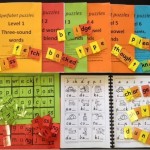Spelling for grown-ups 1: /s/ spelt C and /j/ spelt G
17 Replies
Hooray for recent media reports of a greater emphasis on phonics in the draft Australian National Curriculum.
I’m not a fan of some of the other proposed changes, but more and better teaching of phonics and word-building should prevent a great deal of reading/writing failure, especially among disadvantaged students.
Unfortunately, adults – including many teachers – tell me that they were never taught much about how our spelling system works. This makes it hard for them to teach it well.
I’ve therefore started making a series of what I hope are helpful 5-minute videos for adults about major spelling patterns. Here’s the first one:
Once teachers understand our spelling system, and aren’t hamstrung by unhelpful curriculum requirements, they’ll drop unhelpful spelling-teaching approaches like rote-memorisation of high frequency wordlists, silently writing the same word in many different colours, and other activities not focussed on linking a word’s sounds, spellings and meanings.
Teachers will be able to systematically, explicitly and authoritatively teach how speech sounds are represented by spellings, and how many long words are built from meaningful parts with special spellings. This will help many more children learn to spell and read successfully.



Great stuff (from one of those teachers whose teaching would benefit from better knowledge in this area!)
Allison for PM!
Hahahahahaha, thanks, Alistair! If every teacher was as interested in spelling as you, I’d probably be looking for a job, but not sure that’s the one! Alison
Thank you so much! I was never taught these rules & only have begun to learn these rules as I teach…..
This is wonderful!!! Thank you so much for doing this!!! Where will we find these? On your website or on your YouTube channel? So grateful for all you do!
Hi Mary, thanks so much for this lovely feedback, the videos will all be in the “Explaining Spelling” playlist on my YouTube channel, https://www.youtube.com/user/spelfabet/playlists
This is great, I can’t wait to see more videos in this series.
I’ll be writing a blog post about each one, and they will be in the Explaining Spelling playlist on my Youtube channel https://www.youtube.com/user/spelfabet/playlists
So succinct and useful! These are the spelling tendencies that we teach in Reading Simplified when students are mostly through their initial code learning. I’m tagging this on Youtube for PD. Thank you!
P.S. About half of the time, strangers read my last name “Ginsberg” as /jinsberg/. Alas, if only the tendency were more reliable!
Alas, if only the tendency were more reliable!
Yes, my friend Gemma is pronounced with a /g/ but at her dad’s funeral the celebrant kept saying Gemma with a /j/. Sigh. Thanks for the lovely feedback!
That’s a sad place for that to happen! I’ve never heard that pronunciation of Gemma in the US.
Thank you once again for your insight to enable teachers to help their students understand how our spelling system works. I always appreciate your expertise. I use your sets of words constantly with my students. Thank you.
Thanks so much for the lovely feedback, much appreciated, I’m so glad you find my lists useful. Alison
I am a former (now well retired) teacher of children with disabilities. My greatest frustration was trying to ‘get’ my teacher aides to understand the difference between voiced and unvoiced letter sounds, so that they used them correctly with their students who had reading difficulties. Then when I went back to the children, they would be pronouncing unvoiced sounds as voiced again. Aaagh!
Such a great initiative Alison!
But the missing slash mark after the /s in the blogpost title is doing my pedantic head in!! X
Thankyou for your excellent editing, I can’t believe I didn’t notice that. I’ve fixed it now. Alison
I would love to have a copy of your word lists for this video!
Hi Caroll, are these lists any use? http://www.spelfabet.com.au/spelling-lists/sorted-by-sound/s/c-as-in-cell
https://www.spelfabet.com.au/spelling-lists/sorted-by-sound/j/g-as-in-gel.
I have loads of word lists here, working from either sound to spelling or spelling to sound, or there is an example teaching sequence: http://www.spelfabet.com.au/spelling-lists